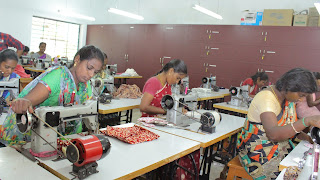Seminar & Discussion
The Seminar on Sustainable
Livelihoods, understanding recent reports was organized on the sidelines of the
Seed Festival organized by SLI in Bharat Nivas and took place in the Bhumika
hall between 11 a.m. and 1.30 p.m.
The Seminar was co-organized by the
Centre for Social Enterprises and Innovation (CSIE), IIT-M. Mr.
Ramasubramanian, Director of SLI in his introductory remarks mentioned that it
was a coincidence that 3 reports that were talking about climate change impact
on livelihoods in India were released within 15 days in the month of June and
that prompted the organizing of the seminar. While the World Bank report spoke
of Climate Change and its possible implications in the South Asia region with a
focus on livelihoods, the NABARD report spoke of the cropping cycle and pattern
and the need to alter some of these. The Niti Aayog report on irrigation management
spoke of the performance and efficiency of irrigation systems and compared
performance of different states and in the process also highlighted the
irrigation challenges of the states. Ms. Aishwarya from CSIE made a detailed
presentation on the 3 reports drawing heavily from the data presented in the 3
reports. She highlighted how the 3 reports had used different indicators, but,
had a clear message that unless the cropping and irrigation patterns were
shifted radically, India as a whole is in for some tough challenges in the
coming years on sustaining its livelihoods.
The Seminar was attended by Experts
in the field of irrigation and agriculture, academics, scholars and civil
society participants.
Mr. Tom Gablier of the Auroville
Water Services spoke of the depletion of ground water in the Auroville
bio-region and how the first well had gone dry this year. He spoke of the
inadequacy in the understanding and practices of irrigation in the region and
the unnecessary usage of chemicals in agriculture. He also felt that there was
inadequacy in the data that was being used in the reports and the situation
could be far worse than what has been projected in the reports. Ms. Aster Patel
from Bharat Nivas said that some of the issues being discussed during the
Seminar were an eye-opener for her. Mata Atmavikasa Priya Amba of the Sri
Sarada Ashram, Ulundurpet said that some of the efforts that the ashram has
been doing to conserve the traditional seeds of paddy perhaps may have to be
extended to other crops now as well, as the climate resilience of paddy to some
of the scenarios projected seemed to be suspect.
The Seminar concluded with an idea to
continue the discussion on the emerging climate change scenario and the need to sustain a dialogue and influence
practices within the Auroville region as well as in other parts of the State.



















































